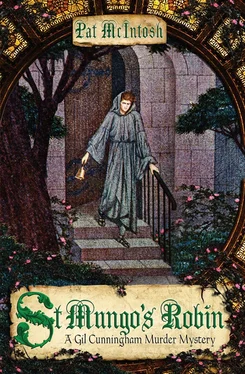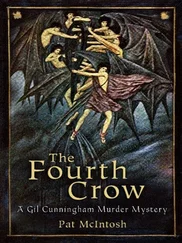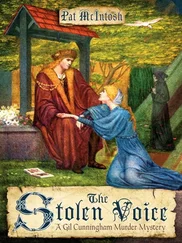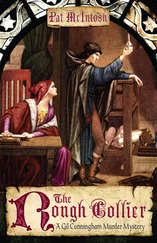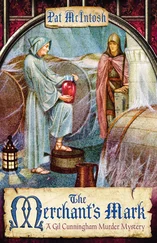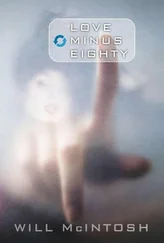He turned his head on the pillow and drew the red woollen curtain aside to look out into the chamber, where the early light was growing. The blue milk-paint had dried to a pleasant misty shade, though now it looked colourless. The four Cardinal Virtues showed up well on the wall by the hearth behind his head, and opposite them, facing the foot of the bed, Maister Sproat had depicted his own choice of saints: the Visitation, with the Virgin and St Elizabeth dressed like Scots women and crowned with jaunty rose-bordered halos; and in plain halos, St Giles and his pet doe standing stiffly by St Mungo. One could tell it was St Mungo; he had a mitre as well as a halo, and held a green branch in one hand and a robin the size of a goshawk on the other, its red breast showing bright already as the light strengthened.
Like any son of the grammar school or the University, Gil knew the story, how Mungo’s fellow pupils had killed the bird to get him into trouble with their teacher St Serf, whose pet it was, and how Mungo had brought it back to life. He lay in the dawn looking at the image, wondering if he could bear seeing it every morning in life, and suddenly recalled Humphrey. He was a shrike, but now he’s a robin, because he’s deid.
‘Of course he was a robin!’ he said aloud. ‘He was left in the garden to get someone else into trouble.’
‘Mmf?’ said Alys. He turned to her, getting up on one elbow. She opened her eyes and smiled up at him. Now this on the other hand, he thought, I really could bear to see every morning when I wake.
‘Naismith,’ he said. ‘You remember Humphrey said he was a robin.’ She made a faint noise of assent. ‘I was looking for a sparrow, but I had the wrong robin. Agnew tried again and again to get Humphrey into trouble — to get him accused of killing the Deacon. Of course Humphrey said Naismith was a robin. St Mungo’s robin, who was killed to get him into trouble.’
‘Of course,’ said Alys, blinking sleepily at him.
He leaned down and kissed her, and she put her arms round his neck and kissed him back.
‘Gil, are we really married?’ she said after a moment. ‘I didn’t dream it all?’
‘We’re really married,’ he agreed. ‘And no prospect of an annulment, if I mind matters aright. Darf ich naught the rose stele, And yet ich bar the flour away.’
‘I don’t know why I was afraid,’ she admitted.
‘I hope you’ll never fear me again,’ he said seriously.
‘It wasn’t you I feared.’ She curled closer to him. ‘Gil, listen. When my father bought this house, there was a ceremony with the two men of law, when they handed him a padlock and some earth — ’
‘Sasine,’ he agreed. ‘He would have to take sasine of the property, and those represent the building and the land it’s on.’
‘Yes. And I thought, yesterday, that the rings we gave.’ He felt the hand at the back of his neck stir as if she was rubbing her ring with her thumb, the fine gold circle with the little hearts and the Latin word SEMPER. ‘That was as if we exchanged sasine, wasn’t it?’
‘Sasine of one another,’ he amplified, and tightened his clasp on her, charmed by this idea. ‘So you’re mine, and I’m yours, sasine given and taken, without limit of term.’
‘For always,’ she agreed, and drew the covers further up round them both. ‘Just as it says on my ring. Always.’
